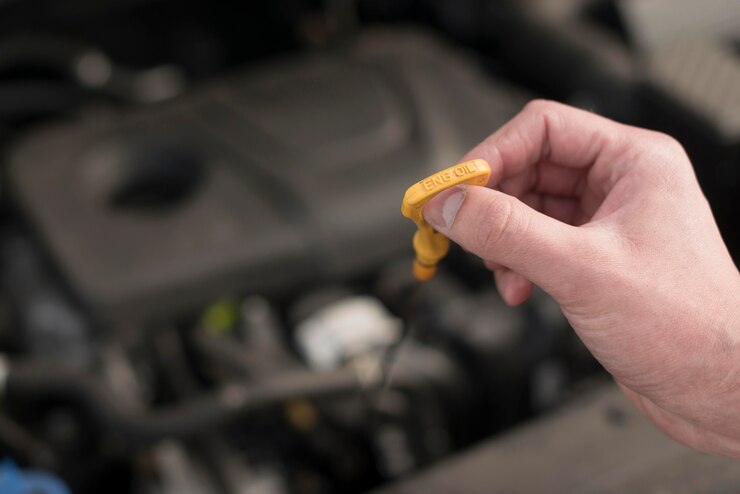Car
How Often Should You Change Your Oil? A Simple Guide

Engine health depends on routine oil changes. The type of oil, driving circumstances, and your vehicle all affect the optimal frequency. While synthetic oil can last 7,500 to 10,000 miles, conventional oil must be changed every 3,000 miles. Check your owner’s manual for specific recommendations. Regular maintenance ensures optimal performance, prevents costly repairs, and extends your engine’s lifespan.
Introduction
Caring for your car correctly ensures its longevity and reliability on the road. One essential maintenance task is changing your oil. Knowing when to replace your oil can preserve your car’s engine health and performance. With many factors to consider—such as engine type, driving habits, and vehicle age—pinpointing the proper interval for an oil change can be a bit confusing. Interestingly, the same occasion might coincide with the need for a Quick Tire Rotation Service, making it doubly convenient.
Understanding oil change intervals is crucial for both experienced and new drivers. It helps save time and money, ensures optimal vehicle performance, and provides peace of mind.
Understanding Oil Change Intervals
The frequency of oil changes can vary greatly depending on several variables. Traditional guidelines suggested changing oil every 3,000 miles because older engines and oils couldn’t sustain prolonged performance. However, advances in automotive technology have shifted the narrative. Manufacturers now often recommend oil change intervals between 5,000 and 10,000 miles, thanks to high-quality synthetic oils and improved engine designs. Always prioritize your vehicle’s owner’s manual for specified intervals, as these guidelines cater to your car model’s performance requirements.
Factors Influencing Oil Change Frequency
- Driving Habits: City driving with frequent stops or extreme conditions can cause oil to degrade faster. Long highway drives, however, tend to be less harsh on engine oil. Additionally, short trips that do not allow the engine to reach full operating temperature can lead to condensation and contamination of the oil.
- Type of Engine Oil: Synthetic oils can significantly extend oil change intervals as they are engineered to last longer under various conditions. They provide better high and low-temperature viscosity performance and offer superior protection against deposits, helping keep engines cleaner.
- Vehicle Specifications: Your vehicle’s manual isn’t just for show—it contains essential information about optimal oil types and change frequencies. Adhering to these manufacturer recommendations ensures you’re providing your engine with the best possible care.
Signs That Your Oil Needs Changing
Apart from adhering to suggested intervals, stay vigilant for signs indicating it might be time for an oil change. Common indicators include unusual noises from the engine, oil that appears dark, gritty, or thick, and the dashboard oil light turning on. Furthermore, if you notice an oil smell inside the car or see smoke from the exhaust, it may indicate that your oil needs to change. Addressing these signs promptly helps prevent more severe issues, like engine overheating or performance drop-offs, saving you from expensive repairs in the future.
DIY Vs. Professional Oil Changes
Changing your oil can be a satisfactory DIY task if you have a knack for cars. If done correctly, it enables you to keep a close eye on the condition of your vehicle and save money. However, it does require the right tools and know-how, and improper disposal of old oil can pose environmental risks. On the other hand, professional oil changes provide convenience and comprehensive service inspections, guaranteeing that your vehicle stays in excellent condition after the oil change. Professionals also perform additional checks that you might overlook, such as inspecting filters, belts, and hoses to ensure there aren’t any underlying issues.
Cost-Effectiveness of Regular Oil Changes
Frequent oil changes are inexpensive compared to the major repairs that may result from skipping them. Clean oil reduces friction, ensuring smoother engine operation and better fuel efficiency, translating into savings over time. This regular maintenance routine mitigates the risk of engine seizure, overheating, and wear, ensuring longevity and reliability. It’s important to remember that the cost of an oil change is fractional compared to the expenses associated with significant engine repairs due to neglected oil maintenance.
Environmental Impact of Used Oil
Improper disposal of used motor oil poses serious environmental threats, contaminating soil and water. One gallon of used oil can contaminate a million gallons of fresh water. Responsible disposal at certified collection facilities helps reduce your ecological footprint, whether during a professional service or a DIY project. Many service stations and car parts retailers provide recycling services, guaranteeing that the oil is treated properly to avoid harming the environment.
Common Oil Types and Their Benefits
Conventional Oil is suitable for low-mileage and light-duty applications, providing basic protection and performance. It is the most affordable option but does not have the enhanced additives found in synthetic oils.
Synthetic Oil: Offers superior protection, especially in extreme temperatures, and supports better engine response and performance. It contains fewer impurities and superior lubrication qualities, extending the lifespan of your engine’s parts.
Synthetic Blend: This balanced solution is for drivers seeking enhanced protection and performance without the premium cost. It combines conventional and synthetic oils for improved performance and security.
Additional Maintenance Checks During Oil Changes
Oil changes are crucial for a thorough check-up involving inspection of fluid levels, brake systems, tire conditions, and air filter state. These checks can identify issues early, ensuring vehicle safety and efficiency. Longer intervals have replaced the old rule of changing oil every 3,000 miles, but staying informed with updated data and manufacturer instructions is essential for optimal performance and overall vehicle health.

Car
Your Guide to the Best Kia Dealership Brisbane Has to Offer

Choosing the right Kia dealership Brisbane residents can trust is a key part of finding a vehicle that meets your lifestyle and budget. Whether you’re in the market for a new model, a quality used car, or reliable servicing, the right dealership makes all the difference.
In a competitive market like Brisbane, narrowing down your options can be overwhelming. That’s why it helps to know what makes one Brisbane Kia dealership stand out from the rest.
Why Choose a Kia?
Kia vehicles are known for blending affordability, modern technology, and sleek design. From compact city-friendly cars to spacious SUVs, the range available at a trusted Kia dealership Brisbane drivers rely on is well-suited to both urban and suburban lifestyles.
Popular models include:
- Kia Sportage: A versatile SUV that’s perfect for growing families, daily commutes, or spontaneous weekend getaways. It offers generous space, advanced safety features, and a smooth, comfortable ride.
- Kia Cerato: A sleek and compact sedan designed for drivers who want style, practicality, and cutting-edge tech in one affordable package. Ideal for city driving and small families.
- Kia EV6: An innovative electric vehicle that pushes the boundaries of design and performance. With impressive range, rapid charging, and zero emissions, it’s leading the shift toward sustainable driving.
With a reputation for reliability and an industry-leading 7-year warranty, it’s no surprise that Kia remains one of the fastest-growing car brands in Australia.
Finding a Trusted Kia Dealership in Brisbane
When it comes to selecting a Kia dealership Brisbane location, customer service and ongoing support matter just as much as price. A reputable dealer will offer more than just cars — they’ll provide a complete ownership experience.
Toowong Kia stands out as one of the most trusted names in the area, offering a wide range of models, competitive pricing, and expert support. Their team is focused on helping customers select the ideal car for their needs, with personalized service every step of the way.
What You Can Expect
A great dealership will offer services and features that go beyond the initial sale:
| Feature | What It Means for You |
| Extensive Inventory | A broad range of new and pre-owned Kia vehicles |
| Flexible Finance Options | Tailored plans to suit different budgets |
| On-Site Kia Service Center | Easy access to maintenance, repairs, and parts |
| Factory-Trained Technicians | Assurance your vehicle is in expert hands |
| Trade-In Support | Smooth and fair trade-in process for your old car |
This comprehensive support makes it easier to manage your car’s full life cycle, from purchase to long-term upkeep.
Your Local Kia Service Center Brisbane Drivers Recommend
A trusted Kia service center in Brisbane that drivers rely on is essential for peace of mind. Regular maintenance ensures your car performs its best, lasts longer, and retains value. A certified service team understands your Kia inside and out, using genuine parts and up-to-date diagnostic tools.
Whether it’s a routine service or more extensive repair work, qualified technicians help keep your vehicle in peak condition.
Reliable Kia Car Sales Brisbane Locals Trust

.When considering Kia car sales in Brisbane, transparency and trust are key. The best dealerships provide clear pricing, honest advice, and access to the latest offers and promotions. You’ll also benefit from:
- A flexible test drive program that lets you experience different models at your convenience
- A user-friendly online platform to explore the full inventory, compare features, and shortlist vehicles before stepping into the showroom
Continued support after your purchase, including warranty guidance, scheduled servicing, and assistance whenever needed
Choosing the best Kia dealership in Brisbane can ultimately save you time, money, and stress. With the right team behind you, owning a Kia becomes a smooth and enjoyable experience.
Ready to find the right Kia for your lifestyle? Explore Brisbane’s top dealership and enjoy reliable service, competitive pricing, and expert support every step of the way.
Car
The Importance of Witness Testimonies in Car Accident Cases

Witness testimony is a crucial piece of evidence in car accident cases, providing critical insights into the events leading up to the accident. It can provide an unbiased perspective that can strengthen a case. Witness accounts from other drivers, pedestrians, or bystanders can provide a clearer picture of what occurred, making them essential in determining fault and securing fair compensation. This blog explores the importance of witness testimonies in car accident cases.
Role of Witnesses in Car Accidents
Witness testimonies in car accident cases are vital to understanding the complexities of such events. At the scene of an accident, tensions are often high, and emotions can cloud the judgment of those directly involved. This is where witnesses become invaluable, offering an external perspective that may be critical in legal proceedings. These unbiased accounts help outline the sequence of events that transpired, the involvement of each party, and any contributing factors that led to the accident.
How Witness Testimonies Strengthen Claims
experienced car accident lawyer, establishing fault is immensely challenging without substantial evidence. This is where witness testimonies take on a paramount role. When the accounts of those involved contradict each other, a third-party perspective can illuminate the truth. Legal professionals, such as car accident lawyer, often leverage these statements to fortify their arguments in court or during negotiations. Witness accounts can significantly influence the outcome, with more precise, detailed statements providing a solid backbone for a case. Moreover, insurance companies often base their decisions on the strength and credibility of these testimonies, making them vital for claim settlements and jury outcomes.
Verifying the Credibility of Testimonies
Ensuring the reliability of witness testimonies is a crucial step in making them practical tools in legal battles. Various factors determine a witness’s credibility, including their location during the incident, their relationship to any parties involved, and their ability to remember and articulate the specifics of the accident. Legal teams analyze these elements carefully to ensure the witness can provide a coherent and impartial account. This due diligence is imperative to avoid any fallacies within testimonies that adversaries might exploit, thus fortifying the overall strength of the legal argument presented in court.
Technology’s Role in Supporting Testimonies
Technology has increasingly played a supporting role in corroborating witness accounts. The integration of dashcams, smartphones, and other recording devices provides an additional layer of evidence that can either substantiate or challenge human recollections. These technological aids are objective documentation, offering unbiased proof to support or refute witness statements. Technological advancements have added profound depth to judicial processes, which showcases the intersection of modern technology and legal proceedings.
Common Challenges with Witness Testimonies
Despite their invaluable contributions, witness testimonies are not without challenges. Recalling an event accurately can be difficult, mainly as time passes, with memories diluted or altered. Emotional responses at the moment or in subsequent retellings can unknowingly influence a witness’s narrative, leading to inconsistencies. Such issues necessitate a rigorous process of cross-examination and verification against tangible evidence to safeguard the integrity of the testimonies. Overcoming these hurdles requires meticulous legal expertise to ensure that testimonies contribute positively to the legal process rather than detract from it.
Car
Understanding Brake Systems: A Beginner’s Guide

Introduction to Brake Systems
Brake systems are the cornerstone of vehicle safety, designed to provide the control necessary to modulate speed and safely bring vehicles to a halt. These systems, whether compact cars or heavy-duty trucks, ensure safety and efficiency across all vehicles. For anyone experiencing brake issues, it is crucial to consider acquiring brake repair Edmonds WA, to uphold road safety.
Understanding your vehicle’s braking system is not just about knowing how to stop a car; it is about understanding the mechanisms that ensure it happens securely and consistently. The stresses your brakes endure daily necessitate routine check-ups. Equipping yourself with knowledge of your brake system can lead to proactive maintenance, curtailing risks associated with brake failures.
Types of Brake Systems
Today, vehicles are predominantly equipped with two types of braking technology: disc brakes and drum brakes. Disc brakes provide exceptional performance; they use calipers to press pairs of pads against a disc or rotor. In contrast, drum brakes utilize shoes pressing outward against a rotating drum, making them favorable due to their simplicity and cost-effectiveness.
Disc brakes are standard in modern vehicles, and they offer the advantages of effective heat dissipation and greater stopping efficiency. Conversely, drum brakes, found in older vehicle models, offer certain mechanical advantages and are more economical. Understanding these distinctions can help decide the best fit for driving requirements and vehicle design.
Key Components
Several components are crucial to the optimal functioning of a brake system. These include brake pads, rotors, calipers, and brake fluid. Brake pads generate necessary friction against the rotors, slowing down the vehicle, while rotors help disperse the heat from this friction. Calipers, which house the pads, clamp down on the rotors to initiate the braking process.
Moreover, brake fluid is vital, facilitating the force transition from your brake pedal to the brakes. Knowing these components’ detailed function and maintenance is imperative to diagnosing problems and ensuring the vehicle operates smoothly and safely.
Maintenance Tips
Regular maintenance is paramount to ensuring the durability and efficiency of your brake system, thereby maintaining vehicle safety. Essential maintenance tasks include frequently checking the thickness of brake pads for wear, inspecting rotors for any damage or warping, and ensuring the brake fluid is free from contaminants and maintained at optimal levels.
Opting for high-quality replacement parts during maintenance can significantly enhance the system’s reliability and save on future costs. Professional assessments can detect issues not evident in routine checks, and timely replacements of worn-out components can prevent the escalation of minor problems, ensuring continued safety and performance.
Common Issues and Solutions
Braking systems can develop a range of issues, such as squealing noises, decreased braking performance, or vibrations when the brakes are applied. Common causative factors include wear on the brake pads, misaligned rotors, or air in the brake lines. Attention is required to prevent these minor problems from developing into serious, costly repairs.
Understanding these warning symptoms is essential to addressing brake-related deficiencies promptly. As industry experts advocate, regular maintenance is crucial for early problem detection and maintaining a vehicle’s safety and longevity.
The Importance of Brake Safety
Ensuring that brakes are functioning correctly is imperative for driver and passenger safety and the safety of others on the road. Faulty brakes pose significant risks, and it is crucial to prioritize regular inspections and timely repairs to prevent accidents.
If you ever notice unusual sounds or feel a change in braking performance, seeking immediate attention from a certified professional is vital to maintaining safety standards and fulfilling legal road safety requirements.
Innovations in Brake Technology
Recent technological advances have driven significant improvements in vehicle brake systems. From anti-lock braking systems (ABS) to electronic brakeforce distribution, these technologies enhance braking precision and safety, providing drivers better control and significantly reducing accident risks.
Modern braking technology ensures vehicles can perform efficiently across diverse conditions and driving scenarios. Staying informed about these innovations allows consumers to make well-informed decisions regarding vehicle maintenance and purchasing options.
Concluding Thoughts
Every vehicle owner must achieve a comprehensive understanding of brake systems. This enables them to perform informed maintenance, respond appropriately to issues, and stay updated on technological advances in braking. If brake maintenance or repair is needed, consulting with services like those providing brake repair is a wise step toward maintaining vehicle safety and preparedness.
-

 GENERAL1 year ago
GENERAL1 year agoFrom Fan Art to Original Works: The Diversity of doujindesu Creations
-

 Entertainment10 months ago
Entertainment10 months agoEnchantment & Excitement: Crafting Unforgettable Event Experiences
-

 GENERAL11 months ago
GENERAL11 months agoEngland Business Visa Requirements for American and International Citizens in 2025: A Guide for Entrepreneurs
-

 GENERAL9 months ago
GENERAL9 months agoCrossword Conundrum: The Significance of vault opener nyt crossword
-

 GENERAL1 year ago
GENERAL1 year agoLatest Trends in Men’s and Women’s Jackets for the Upcoming Season
-

 GENERAL9 months ago
GENERAL9 months agoExploring the World of nhentai.nef: A Comprehensive Guide for New Users
-

 Health1 year ago
Health1 year agoDiscovering gel ooru: The Ultimate Guide to This Unique Traditional Craft
-

 Entertainment10 months ago
Entertainment10 months agoExploring the World of NHentai: A Comprehensive Guide to nhentai.met